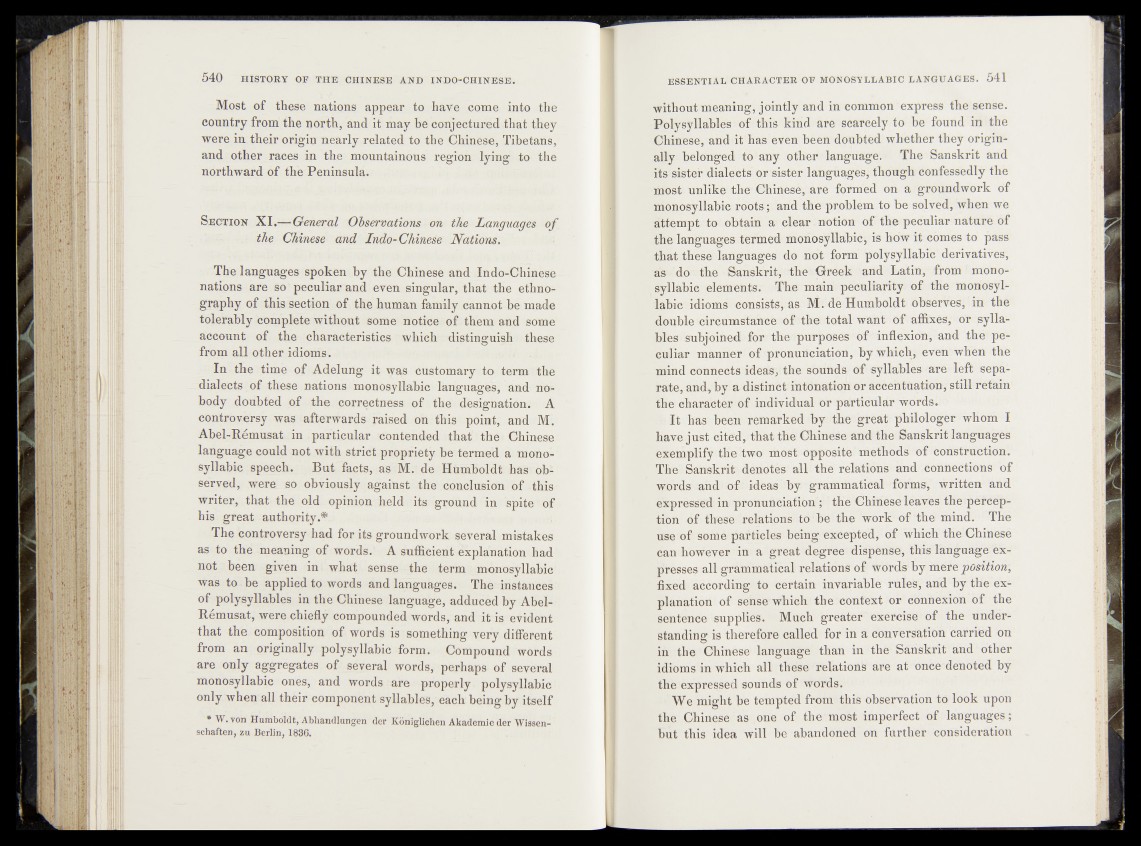
Most of these nations appear to have come into the
country from the north, and it may be conjectured that they
were in,their origin nearly related' to the Chinese, Tibetans,
and other races in the mountainous region lying to the
northward of the Peninsula.
S ec tio n XI.—General Observations on the Languages of
the Chinese and Indo- Chinese Nations.
The languages spoken by the Chinese and Indo-Chinese
nations are so peculiar and even singular, that the ethnography
of this section of the human family cannot he made
tolerably complete without some notice of them and some
account of the characteristics which'*-distingui|h; these
from all other idioms.
In the time of Adelung it was customary to term the
dialects of these nations monosyllabic languages, and ncr-
body doubted of the correctness of the designation; A
controversy was afterwards raised on this^ointf and Mi
Abel-Rémusat in particular contended thafitbè. Chinese,
language could not with strict propfiety .be termed a monosyllabic
speech. But facts, as M. de» Hümboldt has?‘6M:
served, were so obviously against the.conclusioniof this
writer, that the old opinion held»!its ground in spite t:©f
his great authority.*
The controversy had for its groundwork several mistakes
as to the -meaning of words.’ A sufficient explanation had
not been given in what sense the term monosyllabic',
was to be applied to words and languages. The instances
of polysyllables in the Chinese language, adduced by Abel- '
Remusat, were chiefly compounded words, and it is evident
that the. composition of words is something very different
from an originally polysyllabic form. Compound words
are only aggregates of several words, perhaps of several
monosyllabic ones, and words are properly, polysyllabic
only .when all their component syllables, each being by itself
* W. von Humboldt, Abhandlungen der Königlichen Akademie der Wissenschaften,
zu Berlin, 1836.
without meaning, jointly and in common express the sense.
Polysyllables of this kind are scarcely to be found in the
Chinese, and ■ it has even been doubted whether they originally
belonged to any other language. The Sanskrit and
its'sister dialects or'sist'er languages, though confessedly the
most, unlike the Chinese, are formed on a groundwork of
monosyllabic roots ; and the problem to be solved, when we
attempt to obtain a clear motion of; the peculiar nature of
the languages termed monosyllabic^ is how it comes to pass
that these languages do not form polysyllabic’ derivatives,
ais do^the Sanskrit,J'the* Greek and Batin, from ' monosyllabic
elements" The main peculiarity of the monosyllabic
idioms consistsj as M. de Humboldt obsérves, in the
double circumstance of the total want of affixes, or syllables
.subjoined- for’ the purposes ' of''inflexion,- and thé peculiar
manner of pronunciation, by which, even when the
mind connects ideas; the sounds of syllables -are left separate,
andyby a distinct- intimation or accentuation, still retain'
the character »of individual or particular words.
: It has been remarked by the great philologèr whom I
haveijust cited, that the Chinese and the Sanskrit languages
exemplify the two most opposite methods? of construction.
The Sanskrit denotes all the relations and connections of
words anééöfl ideas by grammatical forms, written and
expressed ini pronunciation ; the Chinese leaves the perception
óf these .relations to be the work of the- mind. Thé
use of some particles being excepted, of which the Chinesé
can however in a great degree dispense', this language expresses
all grammatical relations of words by mere position;
fixed according to certain invariable rales? and by th&ek*
planation of sense"which1 the ' context or connexion of the
sentence supplies. Much greater exèrcisë' of the understanding
is therefore called for iff a conversation carried on
in the Chinese language than in the Sanskrit and other
idioms in which all these'relations' are at once denoted by
the expressed sounds of words.
We might be tempted from this observation to look upon
the Chinese as one of the'most imperfect of languages;
hut this idea Will be abandoned on further consideration